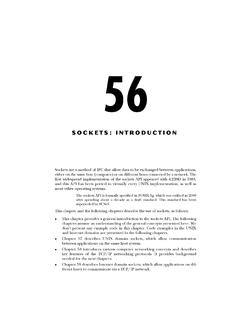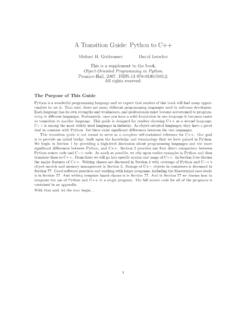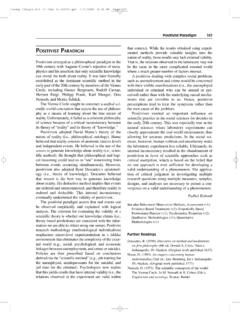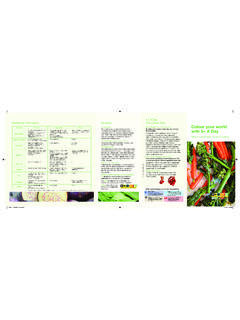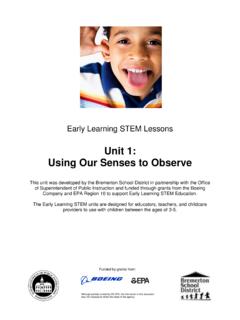Transcription of Remarks on Colour Ludwig Wittgenstein - Denison …
1 Remarks on Colour Ludwig WittgensteinRemarks on ColourLudwig Wittgensteinedited by Gem Anscombetranslated by Linda L. McAlister and Margarete Schattlecolor glyphs by Christian Faur1234567890abcdefghijklmnopqrstuvwxyz wrong, then? @and how did he learn the correct use? -@he constructed an ideal use from the ordinary one. @and that is not to say a better one, but one that has been refined along certain lines and in the process something has been carried to @and of course such a construct may in turn teach us something about the way we in fact use the @if i say a piece of paper is pure white, and if snow were placed next to it and it then appeared grey, in its normal surroundings i would still be right in calling it white and not light grey. @it could be that i use a more refined concept of white in, say, a laboratory (where, for example, I also use a more refined concept of precise determination of time)6 @what is there in favor of saying that green is a primary Colour , not a blend of blue and yellow?
2 @would it be right to say: you can only know it directly by looking at the colours ? @but how do seen pure white. so do most people use the word wrong, then? and how did he learn the correct use? - he constructed an ideal use from the ordinary one. and that is not to say a better one, but one that has been refined along certain lines and in the process something has been carried to and of course such a construct may in turn teach us something about the way we in fact use the if i say a piece of paper is pure white, and if snow were placed next to it and it then appeared grey, in its normal surroundings i would still be right in calling it white and not light grey. it could be that i use a more refined concept of white in, say, a laboratory (where, for example, I also use a more refined concept of precise determination of time).
3 6 what is there in favor of saying that green is a primary Colour , not a blend of blue and yellow? would it be right to say: you can only know it directly by 1 @a language-game: report whether a certain body is lighter or darker than another. -@but now there s a related one: state the relationship between the lightness of certain shades of Colour . (@compare with this: determining the relationship between the lengths of two sticks-and the relationship between two numbers.)-the form of the propositions in both language-games is the same: x is lighter than y . @but in the first it is an external relation and the is temporal, in the second it is an internal relation and the proposition is @in a picture in which apiece of white paper gets its lightness from the blue sky, the sky is lighter than the white paper. @and yet in another sense blue is the darker and white the lighter Colour (Goethe).
4 @on the palette white is the lightest @Lichtenberg says that very few people have ever seen pure white. @so do most people use the word 1 a language-game: report whether a certain body is lighter or darker than another. - but now there s a related one: state the relationship between the lightness of certain shades of Colour . ( compare with this: determining the relationship between the lengths of two sticks-and the relationship between two numbers.)-the form of the propositions in both language-games is the same: x is lighter than y . but in the first it is an external relation and the is temporal, in the second it is an internal relation and the proposition is in a picture in which apiece of white paper gets its lightness from the blue sky, the sky is lighter than the white paper. and yet in another sense blue is the darker and white the lighter Colour (Goethe).
5 On the palette white is the lightest Lichtenberg says that very few people have ever 1 Iintermediary or blended colours. 9 @even if green is not an intermediary Colour between yellow and blue, couldn t there be people for whom there is bluish-yellow, reddish-green? people whose Colour concepts deviate from ours -because, after all, the Colour concepts of Colour -blind people too deviate from those of normal people, and not every deviation from the norm must be a blindness, a defect. 10 @someone who has learnt to find or to mix a shade of Colour that is more yellowish, more whitish or more reddish, etc., than a given shade of Colour , who knows the concept of intermediary colours, is (now) asked to show us a reddish-green. @he may simply not understand this order and perhaps react as though he had first been asked to point out regular four-, five-, and six-angled plane figures, and then were asked to point out a regular one-angled plane figure.
6 @but what if he unhesitatingly pointed to a Colour sample (say, to one that we would call a blackish whatever sense). their language-games might only have to do with looking for or selecting already existing intermediary or blended colours. 9 even if green is not an intermediary Colour between yellow and blue, couldn t there be people for whom there is bluish-yellow, reddish-green? people whose Colour concepts deviate from ours -because, after all, the Colour concepts of Colour -blind people too deviate from those of normal people, and not every deviation from the norm must be a blindness, a defect. 10 someone who has learnt to find or to mix a shade of Colour that is more yellowish, more whitish or more reddish, etc., than a given shade of Colour , who knows the concept of intermediary colours, is (now) asked to show us a reddish-green.
7 He may simply not understand this order and perhaps react as though he had first been asked to point out regular four-, five-, and six-angled i know that i mean the same by the words primary colours as some other person who is also inclined to call green a primary Colour ? @no,- here language-games @someone is given a certain yellow-green (or blue-green) and told to mix a less yellowish (or bluish) one-or to pick it out from a number of Colour samples. @a less yellowish green, however, is not a bluish one (and vice versa), and there is also such a task as choosing, or mixing a green that is neither yellowish nor bluish. @I say or mixing because a green does not become both bluish-1 and yellowish because it is produced by a kind of mixture of yellow and s note: Wittgenstein wrote greenish here but presumably meant bluish.
8 @people might have the concept of intermediary colours or mixed colours even if they never produced colours by mixing (in whatever sense). their language-games might only have to do with looking for or selecting already existing looking at the colours ? but how do i know that i mean the same by the words primary colours as some other person who is also inclined to call green a primary Colour ? no,- here language-games someone is given a certain yellow-green (or blue-green) and told to mix a less yellowish (or bluish) one-or to pick it out from a number of Colour samples. a less yellowish green, however, is not a bluish one (and vice versa), and there is also such a task as choosing, or mixing a green that is neither yellowish nor bluish. I say or mixing because a green does not become both bluish-1 and yellowish because it is produced by a kind of mixture of yellow and s note: Wittgenstein wrote greenish here but presumably meant bluish.
9 Cp. 111, 5 1588 people might have the concept of intermediary colours or mixed colours even if they never produced colours by mixing (in they speak, English, and thus have all the English Colour words, they would still use them differently than we do and would learn their use differently. @or if they have a foreign language, it would be difficult for us to translate their Colour words into ours. 14 @but even if there were also people for whom it was natural to use the expressions reddish-green or yellowish-blue in a consistent manner and who perhaps also exhibit abilities which we lack, we would still not be forced to recognize that they see colours which we do not see. @there is, after all, no commonly accepted criterion for what is a Colour , unless it is one of our colours . 15 @in every serious philosophical question uncertainty extends to the very roots of the problem.)
10 @we must always be prepared to learn something totally new. 16 @the description of the phenomena of Colour -blindness is part of psychology: and therefore the 133 imagine a tribe of Colour -blind people, and there could easily be one. they would not have the same Colour concepts as we do. for even assuming they speak, English, and thus have all the English Colour words, they would still use them differently than we do and would learn their use differently. or if they have a foreign language, it would be difficult for us to translate their Colour words into ours. 14 but even if there were also people for whom it was natural to use the expressions reddish-green or yellowish-blue in a consistent manner and who perhaps also exhibit abilities which we lack, we would still not be forced to recognize that they see colours which we do not see.
